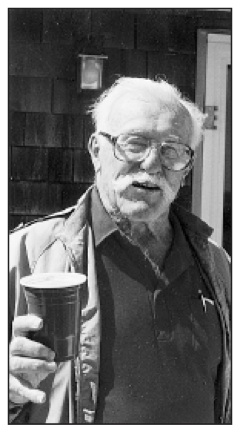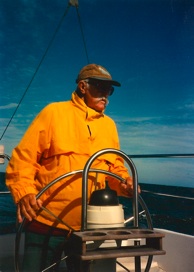
Young Family
Under construction - need input from the Young Family
Howard W, “Bung” Young
Growing up in Harthaven in the summers between the World Wars was a blast. Days were filled with swimming and sailing or, on rainy days, bowling, a matinee or at the merry-go-round and then to a store to pick out scatological souvenirs.
There was a store on Circuit Avenue that sold things that looked like dog poop which you could put on a rug and make someone like our maid, Mary Kerry, exclaim, “Oh you bad dog. You did this, ain’t it?” I once bought a pin with what looked like a common housefly on it that I stuck in the butter during lunch one day. My grandmother, Mary Jane Doen Hart, went nearly crazy trying to shoo that pest off the butter, but it just would not fly away.
We had a great extended family and they were all very kind to us kids. The “hired help,” our Mary Kerry and her daughter, Julia, and my grandparents’ chauffeur, Bob Lyon and their maid, Anna played pinochle in the kitchen after all of us (Grampa George and Granny, Mother and Dad, brothers
Bill and Geoff and I) had gone to bed.
There was a great gang of us kids and Norm Eddy was perhaps my best friend. My grandmother loved fruit and always kept a large bowl of it on the sideboard in our dining room. When the gang came over, they would clean out the bowl in short order. We all knew each other so well because most of us came from New Britain in the first place.
The downside came when, during the Depression, we had to rent to a better-off family from Scarsdale. Those summers I was farmed out as a guest of Howdy and Norm Eddy and/or as a paying guest of Aunt Ale’s Crow’s Nest summer camp. My cousin Pete Hart was sort of head counselor and ruled the roost. At the start of the Great Depression my weekly allowance was 25 cents. But as finances worsened, it finally dropped to only a nickel. A couple of us would go around to other houses in Harthaven holding tin cans. We were always welcome so we’d go right in jiggling our little cans, chanting loudly, “Money, Money!”
We were busy. There were swimming lessons, sometimes tennis lessons, lots of sailing. “Bung” Young in Harthaven - a Brief History



Jim, our great uncle Howard Hart, bought a number (six, I think) of two-man sailing dinghies and had us racing several days a week, sometimes in Farm Pond, sometimes in Nantucket Sound. These were essentially rowboats that he had fitted with a centerboard, a mast and some kind of a rag for a sail. When we were off Buoy Beach, he would have seamanship races that required the crew to wait for the starting gun before swimming out to their boats, weighing anchor and raising sail and then heading for Harthaven harbor without colliding with a fellow contestant.
A typical day in the 30s, when we weren't racing, began when I got up early and went down to the kitchen. Mary Kerry would be there stoking up the coal stove. Anna, Bob Lyon and Julia would arrive for what was a very sociable breakfast, me included. But I would have to sit through breakfast again when the rest of my family came down. Other kids would show up and we would head for the harbor. I had a rowboat I greatly prized, called the Green Pea. Yes, it was painted green, and I devoted many hours sanding and varnishing its insides. Then we would go for a swim followed by a large, sit-down lunch. After that I would rest for about half an hour, reading. Then back to the harbor or beach. One time a hurdy-gurdy man came by, and I thought he was grinding out wonderful music. I can remember my grandfather sitting in this great wicker "Sidney Greenstreet" chair saying to me, "Bung, come here and take this nickel out to that man and tell him it's his if he'll only go away." I was crushed.
But the most fun was with Jim and his ice-cream parties. He would meander past the homes in his huge Pierce Arrow with the top down, calling out, "Ice cream," and all the kids would come running and hop aboard. Sometimes we went to Keating's or Pearson's on Circuit Avenue and sometimes all the way to Edgartown. Jim would give each of us 15 cents, which was enough for two cones. Then we would climb up on the stored top behind the rear seat and bombard the pavement on the way home with globs of ice cream.
Every Tuesday night I'd get dressed up in my white flannel slacks, tie and blue blazer and go with my grandmother to the Phidelah Rice Playhouse in East Chop. During intermission the ushers would sell Priscilla Hancock candies. Every year Phidelah would play Hamlet. This experience got me started on theater for life.
As a teenager I became involved with the kids over in East and West Chop. In fact, at age 18 I had a girl friend I was crazy about by the name of Peggy Kirk. She was from West Hartford and stayed on Waban Park in Oak Bluffs. I'd go to all the East Chop dances every Tuesday night and to a lot of Edgartown Yacht Club dances. And even some up at the Chilmark Tavern. And then there were the parties at my parent's shack in Chilmark. Also when I was 18, I landed my first job, as a reporter for the Vineyard Gazette.
Speaking of Chilmark, my grandfather wanted to buy some land there in the '20s. He had made an offer to a Mr. Lothrop but was rebuffed. But in 1926, Mr. Lothrop's house inland near Fulling Mill Brook burned down. (My niece Caroline and her husband John Moore built a house near the old foundation there in 1996.) Elliot Mayhew once related to me that the house went up in flames very quickly because Lothrop was a hunter and had a lot of ammunition stored in the house, and the fire department volunteers refused to get near the place because of the exploding shells. Well, Mr. Lothrop hopped on his bicycle and pedaled down to Harthaven and dropped in on Grampa, telling him he would now sell. He sold the 73 acres on Fulling Mill, another 21 acres across South Road from the Allen farmhouse where we had our shack (and where Hallie and I built our Safari House in 1970) plus an additional 30 or so acres where Pete Hart (and a number of others) have their cottages - all for, as I recall, $5,000!
After World War II, a number of boats from Harthaven would race on Wednesdays and Saturdays over at Edgartown. One day Alexander Orr invited me to join the race committee on the committee boat. After a number of drinks, the Edgartown contingent loosened up and let me know they thought the Harthaven people were complete snobs because they never stayed after the races and they never invited anyone to use Harthaven harbor. Of course the Harthaven people thought the Edgartown racers were very formal and proper, way too much for us rubes from Harthaven!
Most years my Dad would enter the regatta to Nantucket. One time we were having drinks in the Mad Hatter restaurant in Nantucket. After a few, as we became louder and louder, an old biddy came stalking over to our table and said, "Well, I'm sorry. We can't have all this noise. You people will have to learn to be quiet." With that my father said, "Well, that's enough of this place." Whereupon he stood up, got up on the table and exited out the window. The rest of us followed.
Could it possibly be that we were spoiled kids? Actually, we were brought up believing we deserved the good life we experienced in Harthaven because of our successful and hardworking forebears. Many of my grandparents' and great grandparents' generation became "captains of industry" in New Britain because of their entrepreneurship and innovative, even inventive, ways. We really thought we were a bit above the norm. No matter where I was, I knew I could always come back to the Vineyard and be treated as someone special by the family. I knew I was lucky and I was well aware of those less fortunate, largely because of my mother's charitable work. But I believed this was just the way things were and that our way of life should be preserved.
Courtesy John Moore - Harthaven - A History